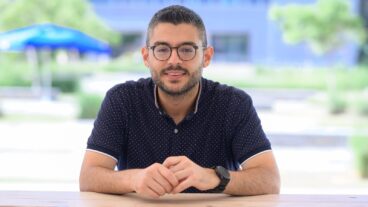Maybe being different is my destiny, Enas Messalha, Israel’s first Arab opera singer.For opera singer Enas Messalha, singing is as natural as breathing. “As a young girl I remember myself singing and dancing on every occasion,” she admits. It was only at the age of 18, however, that she was introduced to classical music. She never looked back.
Eleven years on, Messalha, Israel’s first Arab opera singer, has come a long way from Daburiya, the small village in the Galilee where she was born. Today she lives in Berlin, the capital of opera, and is a member of the Opera Studio program run by Staats Opera, performing regularly throughout Europe.
Messalha’s career highlights include concerts at the Carnegie Hall in New York and at Tangelwood Festival.
Messalha, a Muslim, began her career at the Rubin music academy in Jerusalem. “When I came to my parents and declared my intention to become an opera singer they were amazed at first by the idea,” Messalha tells ISRAEL21c. “To be honest, I wasn’t sure myself what being an opera singer actually means and the consequences of my decision.”
During her first two years at the academy, Messalha kept quiet and listened.
“There was simply too much to absorb,” she admits. “Moving from the village to a big city; the transition from Arab music, which leaves room for improvisation to classical music which has restricted boundaries and rules – I needed time to get acquainted with that music.”
Discovering new worlds
“My teachers at the academy realized my potential and allowed me to take all the time I needed,” she adds. “Eventually music made it possible for me to discover new worlds and meet such interesting people.”
Messalha’s first stop after the academy was at the Israeli Opera, and she was sponsored for many years by the Israeli Opera?s Opera Studio.
A meeting with maestro Daniel Barenboim accelerated her musical career. The conductor, who was impressed by her audition in Tel Aviv, invited Messalha to perform under his baton at the renowned ‘La Scala Milan’ opera house. Later on he was the one who asked her to join the Staats Opera’s studio in Berlin.
While Messalha performs mostly in Europe, she still comes to Israel regularly. In December last year she arrived in Israel to sing with the Italian orchestra Turchini, for a special “Life and Peace” concert. The concert was first performed in Bethlehem, and then the following day in Jerusalem, just before Christmas.
It is the seventh year in a row that the concert has been held here, and the second year Messalha took part. “The organizers of the concert heard of me in Berlin and invited me to join their initiative and of course I was happy to do so. When I perform in Bethlehem it feels different. I feel they are proud of me,” she says.
For Messalha, who has succeeded in breaking many stereotypes, none of this would have been possible without the support of her parents. “They were there for me every step of the way,” she explains. “My mother used to tell me how I was always so different from the rest of the girls in our village and maybe being different is my destiny,” she says with a smile.
Making her village proud
“When I’m in Europe people tend to ask me questions about the political situation in Israel and I do my best to answer them,” she continues. “Often I need to explain the meaning of being an Israeli-Arab because they are not acquainted with the term. The people of my village are extremely proud of my achievements and though I never claimed to be their representative I do my best to make them proud of me,” she says.
In April, Messalha returned to Israel to work on a promising new project – the first Palestinian Opera. The project’s initiator is Anna Bruening, a German citizen who lives with her husband in Ramallah.
“When Anna approached me and asked for my cooperation on the project I was very thrilled and immediately gave her my consent,” Messalha tells ISRAEL21c. “She was the one who gathered the texts and music for the opera and later on got them translated into Arabic.”
The opera is scheduled to be performed in Ramallah this June. “I am sure it will be a great success,” says Messalha.












